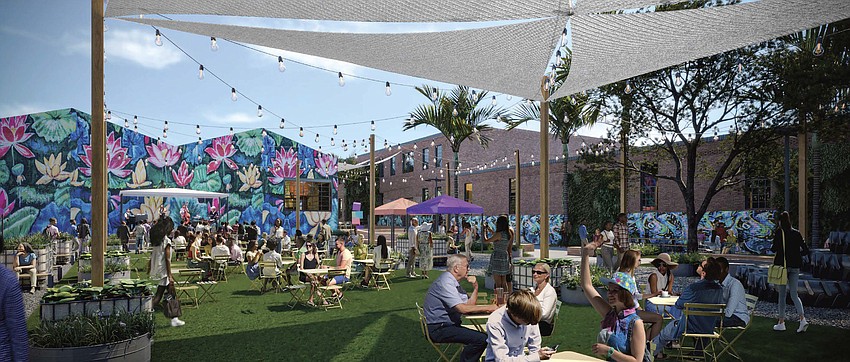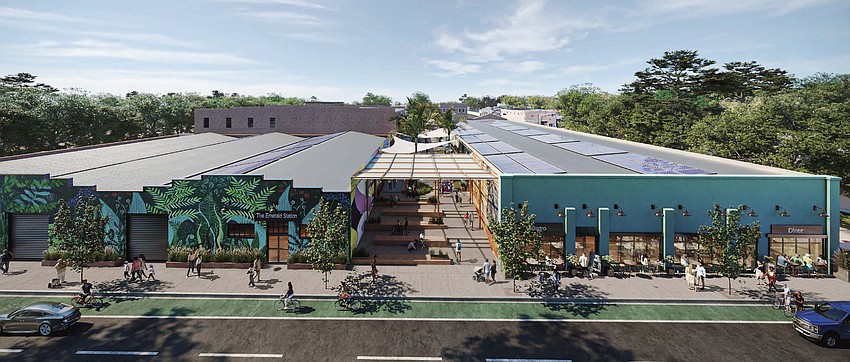
With the first phase of the Phoenix Arts & Innovation District partially complete, the principal developer behind the mixed-use project in North Springfield says he and his team are planning vertical construction that would help push the total investment to as much as $500 million.
Tony Cho, founding managing partner of PHX JAX, said during a Jan. 16 event at the district that the first new construction project would be a 290-unit mixed-income apartment development on Main Street. A community grocery also is part of the plan, with other major projects to follow.

“Fully developed, you’re talking about $400-500 million,” he said.
That figure is more than 10 times the $38 million being invested in the Phoenix’s first phase, which involves adaptive reuse of several early 20th century industrial buildings on 8.3 acres. The first renovated building, the 17,000-square-foot Emerald Station, opened in October 2024 with a 10,000-square-foot event space, offices, meeting rooms and a catering kitchen.

As CEO of Miami-based Future of Cities, Cho had a lead role in similar developments that began with adaptive reuse at Miami’s Wynwood Art District, Magic City Innovation District and Little Haiti.
“This is what’s called a covered land play, which means basically you’re getting a return just from the adaptive reuse and then in the vertical development, that’s where the profits really lie,” he said, adding that the return from the adaptive reuse element in the Phoenix district will be 8%.
Over the past 20 years, Cho said, he had delivered returns on investment of 40% or more from covered land plays.
“I think this will be our best project,” he said. “But I think what’s more exciting about this is that it will accomplish more of the social and environmental goals than Wynwood did, than Magic City did.”

Cho made his remarks at a screening of the Amazon Prime documentary series, “Road to Utopia,” in which he is featured. The eight-part series focuses on innovators in such fields as education, energy, the economy and health and well-being. Cho is spotlighted as a leader in sustainable communities.
In the documentary, Cho discusses his philosophy of creating “regenerative” communities that are built with environmental sustainability, resilience and livability in mind. Renewable energy and green spaces for food production and recreation are central parts of Cho’s strategy.
Plans for the Phoenix district include a community garden where farmers markets will be held. There will be a focus on local entrepreneurship, with PHX JAX saying national retailers and restaurants will not be part of the district.

Locally operated Naked Kitchen, a restaurant with plant-based and protein options and the motto “Cooking with Conscience,” was the first tenant to sign in the district’s Liberty Building. That building, which neighbors Emerald Station to the north, is undergoing renovation.
Cho’s strategy also includes renovating old buildings to preserve a neighborhood’s history and character while also reducing use of new building materials.

“If we just demolished all these buildings, we would make more money,” he said at the screening.
“These buildings cost more money to develop, take more work and are more challenging. But they’re more rewarding,” he said.

“So I believe in adapting and repurposing old buildings, and then building new, regenerative and sustainable development.”
Although the series includes the word “Utopia” in the title, Cho said he believes in “protopia,” a state of constant improvement.
“I’m here to demonstrate that doing the right thing will deliver a higher return,” he said.
“I’m not trying to tell people you have to sacrifice a return on investment.”
Cho said the project would have been impossible without a $5.5 million incentive package approved by the Downtown Investment Authority and City Council, plus a $7 million loan from the Local Initiatives Support Corp.
That entity is a community development organization funded by donations and partnerships with the city of Jacksonville, U.S. Department of Housing and Urban Development, Federal Home Loan Bank and Fannie Mae Foundation.